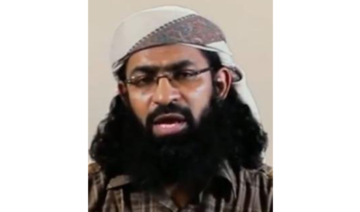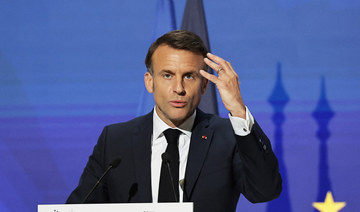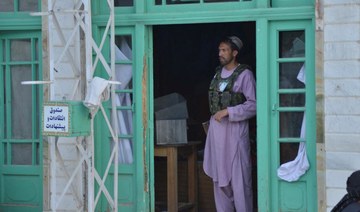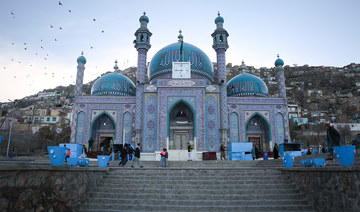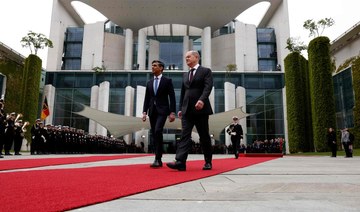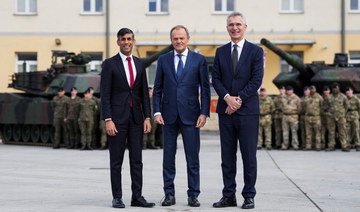REYKJAVIK, Iceland: Top diplomats from the United States and Russia sparred politely in Iceland on Wednesday in their first face-to-face encounter, which came as ties between the nations have deteriorated sharply in recent months.
US Secretary of State Antony Blinken and Russia’s longtime Foreign Minister Sergey Lavrov spoke frankly but calmly of their differences as they held talks on the sidelines of an Arctic Council meeting in the Icelandic capital of Reykjavik, a city with deep history in US-Russian relations.
“We seek a predictable, stable relationship with Russia,” Blinken told Lavrov, echoing comments made by President Joe Biden, who has proposed a summit with Russian leader Vladimir Putin next month. “We think that’s good for our people, good for Russian people and indeed good for the world.”
“It’s also no secret that we have our differences and when it comes to those differences, as President Biden has also shared with President Putin, if Russia acts aggressively against us, our partners, and our allies, we’ll respond — and President Biden has demonstrated that in both word and deed, not for purposes of escalation, not to seek out conflict, but to defend our interests,” Blinken said.
The meeting took place just as the Biden administration notified Congress of new sanctions on Russia over a controversial European pipeline. The administration hit eight Russian companies and vessels with penalties for their involvement in the Nord Stream 2 pipeline, while sparing two German entities from similar penalties.
“We have serious differences in the assessment of the international situation, we have serious differences in the approaches to the tasks which have to be solved for its normalization,” Lavrov said. “Our position is very simple: We are ready to discuss all the issues without exception, but under perception that the discussion will be honest, with the facts on the table, and of course on the basis of mutual respect.”
Even before Wednesday’s talks the two diplomats had laid down near diametrically opposed positions for the meeting, previewing what was likely to be a difficult and contentious exchange over myriad issues including Ukraine, the Arctic, Russia’s treatment of opposition figure Alexey Navalny and accusations of cyber malfeasance, including claims that Russia-based hackers were responsible for a ransomware attack on a key US pipeline.
The meeting also followed a spate of tit-for-tat diplomatic expulsions as US-Russian relations threaten a return to Cold War lows.
Perhaps anticipating Blinken’s position and the expected sanctions announcement, Lavrov had offered a prebuttal at a news conference Monday in Moscow.
“Apparently, a (US) decision was made to promote stable, predictable relations with Russia,” he said. “However, if this includes constant and predictable sanctions, that’s not what we need.”
Blinken said his meeting with Lavrov would be an important opportunity to test the proposition that the US and Russia can work collaboratively on certain issues, like climate change, the Mideast, Iran and North Korea, despite bitter disagreements on others. The meeting comes as much of the world is focused on the Israel-Palestinian war.
Blinken noted that despite the vitriol, the US and Russia had agreed early in the Biden administration to a five-year extension of a key arms control pact that President Donald Trump had declined to renew before he left office. Trump left a decidedly mixed legacy on Russia that included a friendly personal relationship with Putin, while his administration still imposed sanctions and other punitive measures.
Another, more immediate area of disagreement in Reykjavik, the site of the famous 1986 summit between President Ronald Reagan and Russian leader Mikhail Gorbachev, is the Arctic, where Russia has been expanding its military presence and pursuing policies to expand its influence, to the alarm of the Americans.
Blinken noted that the US and Russia have cooperated in the past on Arctic issues, although he glossed over deep American opposition to Russia’s increased military activity in the area and its proposal to renew a long-suspended military dialogue within the eight-nation Arctic Council.
Blinken rejected Russian calls to resume a military component of the Arctic Council and expressed concerns about Russia’s increasing military activity in the region known as the “high North.” On Wednesday, in successive meetings with foreign ministers from other Nordic Council members, Blinken repeatedly referred to the importance of “continuing to maintain this region as one of peaceful cooperation.”
“We have concerns about some of the recent military activities in the Arctic,” he said. “That Increases the dangers of accidents and miscalculations and undermines the shared goal of a peaceful and sustainable future for the region.”
Blinken also took Russia to task for proposing new navigational regulations for the region and decried Lavrov for comments in which he dismissed such criticism because the Arctic “is our territory, our land.”
“We have to proceed all of us, including Russia, based on the rules, based on norms, based on the commitments that we’ve each made and also avoid statements that undercut those,” Blinken said.
In his comments Monday, Lavrov noted the grievances about Russia’s military activities in the Arctic. “It has long been common knowledge that this is our territory, our land. We are in charge of keeping the Arctic coast safe. Everything Russia is doing there is absolutely legal,” he said.
Moscow and Washington are also embroiled in a bitter dispute over the status of their respective embassies and consulates after the diplomatic expulsions. Russia has given the US until Aug. 1 to get rid of all non-American staff at its diplomatic missions, something the US says will make it nearly impossible for its facilities to function.
Top US, Russia diplomats spar firmly but politely in Iceland
https://arab.news/935br
Top US, Russia diplomats spar firmly but politely in Iceland
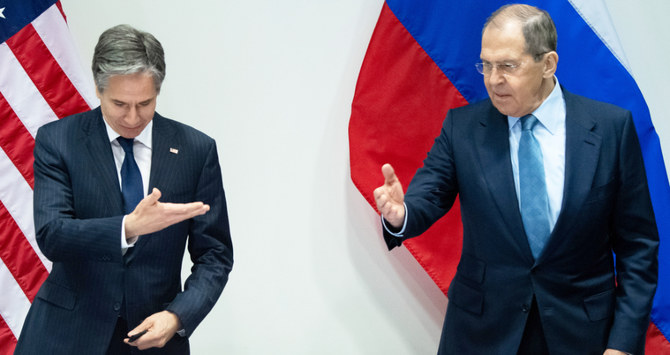
- Blinken said his meeting with Lavrov would be an important opportunity to test the proposition that the US and Russia can work collaboratively on certain issues, like climate change, the Mideast and Iran
Resurgent terror groups in Afghanistan will strike West, warns resistance leader

- Exiled head of National Resistance Front says Al-Qaeda, Daesh presence growing in country
- Taliban emboldened by Western commitment to Ukraine, focus on Middle East
London: Terrorist groups in Afghanistan are regrouping in the wake of the Western evacuation from the country and will strike on US and European soil, the leader of an anti-Taliban movement has warned.
The exiled leader of Afghanistan’s National Resistance Front, Ahmad Massoud, said a terror attack in the US or Europe is “not about a matter of if, it’s a matter of when,” The Independent reported.
Massoud said circumstances in the country and the wider region resemble the pre-9/11 landscape, with terror training camps opening across Afghanistan.
Ali Maisam Naziry, the NRF’s head of foreign relations, said of the resurgent groups: “The attacks in Russia, Iran and Brussels, and the neutralised attack in Germany, are examples of how fast they are moving to threaten global security.”
He added that since the Taliban’s return to power in 2021, Afghanistan has witnessed a “massive influx” of foreign terrorist fighters who belong to the more than 20 militant networks operating in the country, including Al-Qaeda, Daesh-Khorasan and the Haqqani Network.
Massoud warned that the West’s commitment to Ukraine and Israel is serving as a distraction, emboldening the Taliban in the process.
Afghanistan is “no longer a priority” for the Biden administration in the US, he told The Independent last year.
Nathan Sales, a former US ambassador-at-large and coordinator for counterterrorism, said last year: “The continued partnership between the Taliban and Al-Qaeda is perhaps best seen in the fact that after the US withdrawal, Al-Qaeda leader Ayman Al-Zawahiri resurfaced in Afghanistan, living in a safe house associated with the Haqqani Network, a Taliban faction that maintains close ties to Al-Qaeda and is itself a US-designated Foreign Terrorist Organization.
“The key takeaway is that the Taliban felt emboldened to welcome Al-Qaeda’s leader back to Kabul, and Al-Qaeda’s leader felt it was safe enough there to accept the offer.”
Sudanese man detained in UK for deportation to Rwanda: NGO

- Asylum seeker attended routine sign-in at immigration center in London on Monday
- Home Office: First flight to African country ‘set to take off in 10-12 weeks’
LONDON: A Sudanese asylum seeker in the UK has been told of his imminent deportation to Rwanda after attending a routine Home Office appointment, The Guardian reported.
SOAS Detainee Support, an NGO, told the newspaper that the case is believed to be the first under the Rwanda scheme, which has received royal assent.
The UK government policy aims to deport rejected asylum seekers to the African country through a bilateral agreement.
The Sudanese man said he had arrived on Monday to sign in at the Lunar House immigration reporting center in Croydon, south London, but was told he would be deported to Rwanda, and was subsequently detained.
He is one of three people being held after attending the facility, including an Afghan national, SDS said.
The NGO, which offers advice and support to detained asylum seekers, said it had received an “alarmingly high number of calls” since the government’s announcement of Rwanda flights.
A Home Office spokesperson said in a statement: “Now that the Safety of Rwanda Act has passed and our treaty with Rwanda ratified, government is entering the final phase of operationalising this landmark policy to tackle illegal migration and stop the boats.
“This includes detaining people in preparation for the first flight, which is set to take off to Rwanda in 10-12 weeks.”
Daesh claims gun attack killing six in Afghan mosque
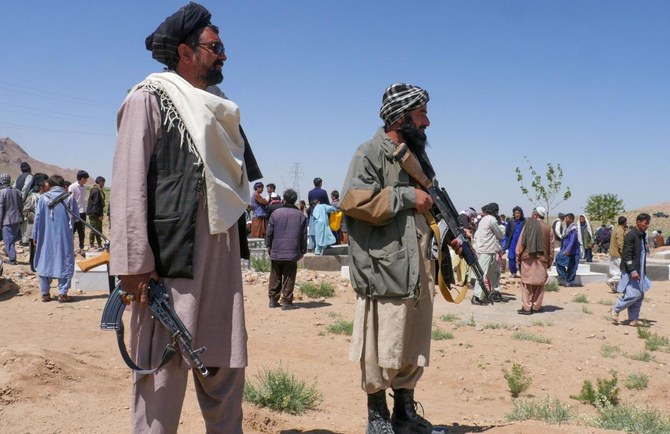
- Daesh said numerous gunmen had stormed the mosque with machine guns
HERAT: The Daesh group has claimed a gun attack on a minority Shiite mosque in western Afghanistan that killed six people on Monday.
Interior ministry spokesman Abdul Mateen Qani said Tuesday morning that “an unknown armed person shot at civilian worshippers in a mosque” in Herat province’s Guzara district at around 9:00 p.m. (1630 GMT) the previous night.
“Six civilians were martyred and one civilian was injured,” he wrote on social media platform X.
Late Tuesday, the regional chapter of Daesh group claimed responsibility and said numerous gunmen had stormed the mosque with machine guns — contradicting the official account of a single assailant.
Locals said the mosque, located just south of provincial capital Herat, served the minority Shiite community and that an imam and a three-year-old child were among those killed.
They said a team of three gunmen had staged the attack.
“One of them was outside and two of them came inside the mosque, shooting the worshippers,” said 60-year-old Ibrahim Akhlaqi, the brother of the slain imam. “It was in the middle of prayers.”
“Whoever was in the mosque has either been martyred or wounded,” added 23-year-old Sayed Murtaza Hussaini.
Taliban authorities have frequently given death tolls lower than other sources after bombings and gun attacks, or otherwise downplayed them, in an apparent attempt to minimize security threats.
Daesh in Afghanistan
The regional chapter of Daesh is the largest security threat in Afghanistan and has frequently targeted Shiite communities.
The Taliban government has pledged to protect religious and ethnic minorities since returning to power in August 2021, but rights monitors say they’ve done little to make good on that promise.
The most notorious attack linked to Daesh since the Taliban takeover was in 2022, when at least 53 people — including 46 girls and young women — were slain in the suicide bombing of an education center.
Taliban officials blamed Daesh for the attack, which happened in a Shiite neighborhood of the capital Kabul.
Afghanistan’s new rulers claim to have ousted IS from the country and are highly sensitive to suggestions the group has found safe haven there since the withdrawal of foreign forces.
A United Nations Security Council report released in January said there had been a decrease in Daesh attacks in Afghanistan because of “counter-terrorism efforts by the Taliban.”
But the report said Daesh still had “substantial” recruitment in the country and that the militant group had “the ability to project a threat into the region and beyond.”
The Daesh chapter spanning Afghanistan, Pakistan and Central Asia claimed responsibility for the March attack on the Crocus City Hall concert venue in Moscow, killing more than 140 people.
It was the deadliest attack in Russia in two decades.
UK local polls could determine PM Sunak’s fate
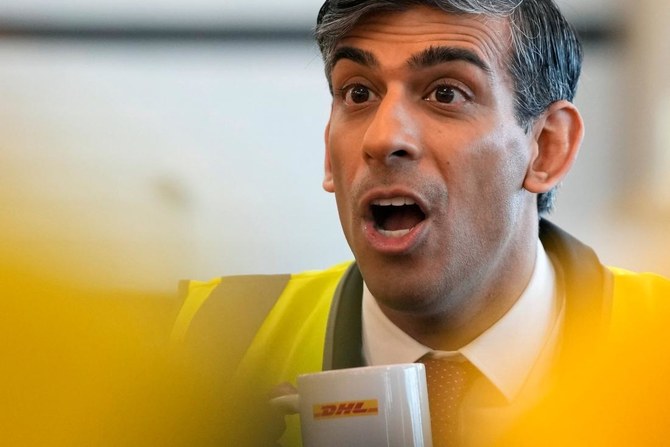
- The polls are the last major electoral test before a general election that Sunak’s party, in power since 2010, seems destined to lose to the Labour opposition
London: Britain’s ruling Conservative party is expected to suffer heavy losses in crunch local elections this week that are likely to increase pressure on beleaguered Prime Minister Rishi Sunak.
The polls are the last major electoral test before a general election that Sunak’s party, in power since 2010, seems destined to lose to the Labour opposition.
Sunak has said he wants to hold the nationwide vote in the second half of the year, but bruising defeats in Thursday’s votes could force his hand earlier.
“These elections form a vital examination for the Sunak premiership — road-testing its claim that the plan is working and the degree to which voters still lend that notion any degree of credibility,” political scientist Richard Carr told AFP.
Incumbent governments tend to suffer losses in local contests and the Conservatives are forecast by pollsters to lose about half of the council seats they are defending.
Sunak’s immediate political future is said to rest on whether two high-profile Tory regional mayors get re-elected in the West Midlands and Tees Valley areas of central and northeast England.
Wins for the Conservative mayors, Andy Street and Ben Houchen, would boost hopes among Tory MPs that Sunak can turn around their party’s fortunes in time for the general election.
But speculation is rife in the UK parliament that a bad showing could lead some restive Conservative lawmakers to try to replace Sunak before the nationwide poll.
“If Andy Street and Ben Houchen both lose, any idea that Sunak can carry on is surely done,” said Carr, a politics lecturer at Anglia Ruskin University.
“Whether that means he rolls the dice on a general election or gets toppled remains to be seen.”
Factional infighting has plagued the Tories in recent years, serving up five prime ministers since the 2016 Brexit vote, including three in four months from July to October 2022.
A group of restive Conservative MPs have drawn up a “policy blitz” for a potential successor to Sunak in the event of massive losses this week, British media have reported.
Some observers say it would be madness for the Conservatives to topple another leader when Sunak has provided some stability since succeeding Liz Truss in October 2022.
Others say the party’s credibility is already shot so why not try one last desperate throw of the dice to try to stop a predicted Labour landslide.
Some 52 MPs would need to submit letters of no confidence in Sunak to trigger an internal party vote to replace him — a tall ask.
“I still expect Sunak will lead the Conservatives into the general election,” Richard Hayton, a politics professor at Leeds University, told AFP.
“But some MPs may seek to move against him, which will further damage his standing with the general public.”
Sunak, 43, was an internal Tory appointment following Truss’s disastrous 49 days premiership in which her unfunded tax cuts caused market turmoil and sank the pound.
Despite numerous leadership resets under Sunak, the Tories have continued to trail Labour, led by Keir Starmer, by double digits in most opinion polls.
An Ipsos poll earlier this month put Sunak’s satisfaction rating at a joint all-time low of minus 59 percent.
More than 2,500 councillors are standing in England on Thursday, as well as London’s Labour mayor Sadiq Khan who is seeking a record third term in office.
Most of the council seats up for re-election were last contested in 2021, when ex-Tory premier Boris Johnson was popular as he rolled out Covid-19 vaccines.
UN Human Rights Chief troubled by ‘heavy-handed’ action against protesters at US colleges
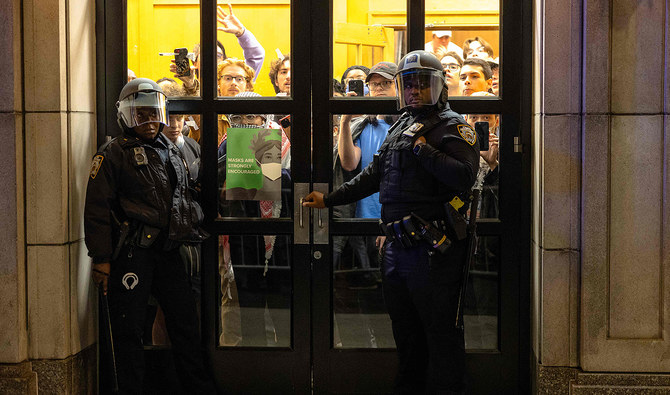
- Volker Turk says ‘freedom of expression and the right to peaceful assembly are fundamental to society, particularly when there is sharp disagreement on major issues’
- Protests have taken place on campuses in several states as students demand colleges withdraw investments from businesses involved in Israel’s assault on Gaza
NEW YORK CITY: The UN’s high commissioner for human rights on Tuesday said he is troubled by “a series of heavy-handed steps” taken by education authorities and law enforcement officials to break up protests at college campuses in the US.
Volker Turk said: “freedom of expression and the right to peaceful assembly are fundamental to society, particularly when there is sharp disagreement on major issues, as there are in relation to the conflict in the Occupied Palestinian Territory and Israel.”
Pro-Palestinian demonstrations have spread across college campuses in Texas, New York, Atlanta, Utah, Virginia, New Jersey, California and other parts of the US as students protest against the death toll during the war in Gaza, call for a ceasefire and demand authorities at their colleges withdraw investments from businesses involved in Israel’s military assault on Gaza.
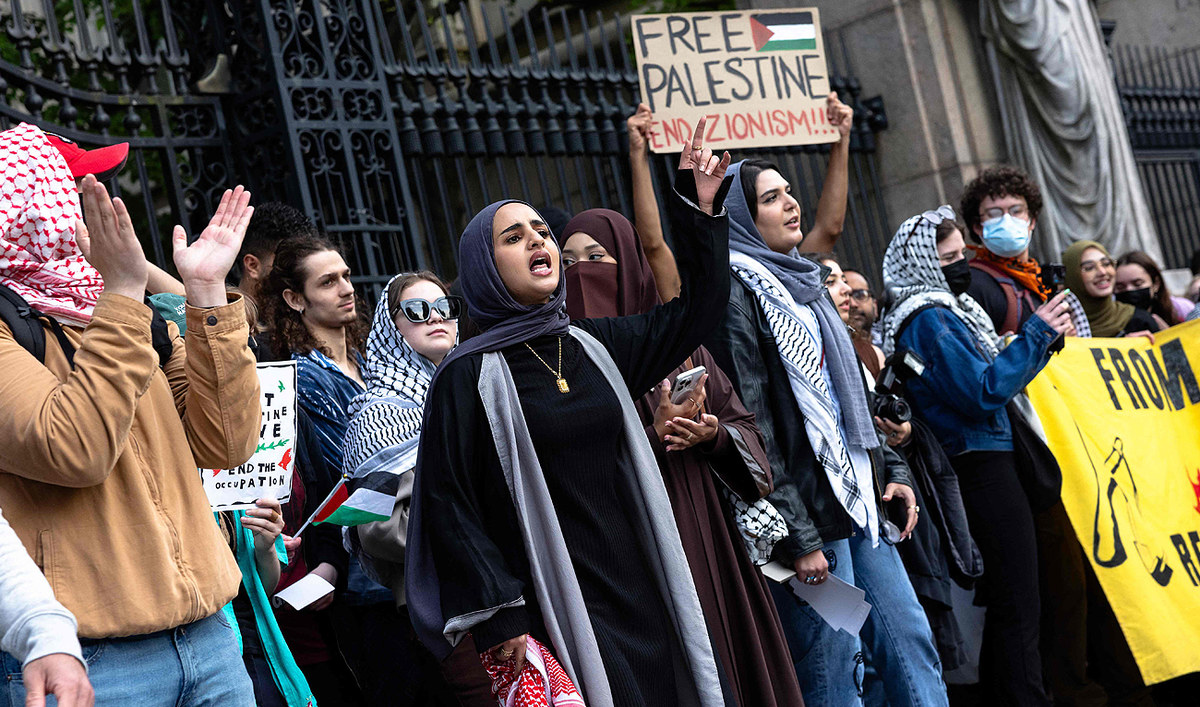
Though largely peaceful, at some locations the protests have been dispersed or dismantled by security forces. Hundreds of students and teachers have been arrested, some of whom face charges or academic sanctions.
Turk expressed concern that some of the responses by law enforcement authorities at several colleges might have been disproportionate, and called for such actions to be scrutinized to ensure they do not exceed what is necessary “to protect the rights and freedoms of others.”
He added that all such actions must be guided by human rights law, while “allowing vibrant debate and protecting safe spaces for all.”
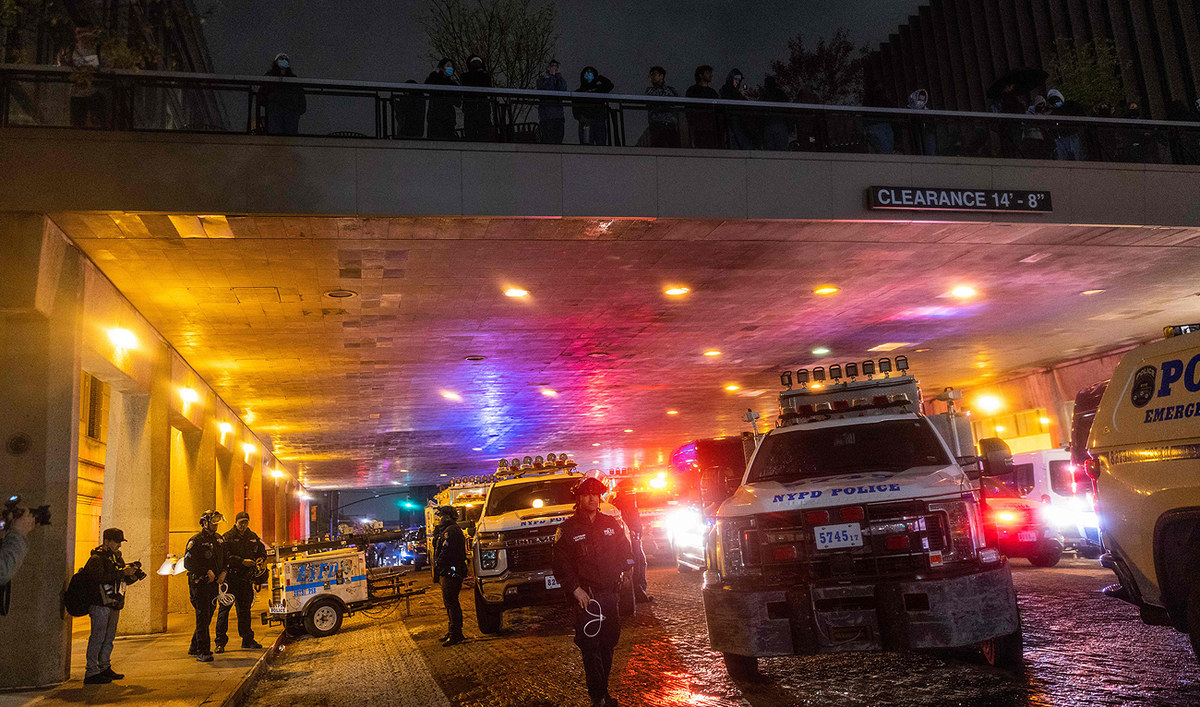
He reiterated that antisemitic, anti-Arab and anti-Palestinian activities and speech are “totally unacceptable, deeply disturbing (and) reprehensible.” However, the conduct of protesters must be assessed and addressed individually rather than through “sweeping measures that impute to all members of a protest the unacceptable viewpoints of a few,” Turk added.
“Incitement to violence or hatred on grounds of identity or viewpoints, whether real or assumed, must be strongly repudiated. We have already seen such dangerous rhetoric can quickly lead to real violence.”




